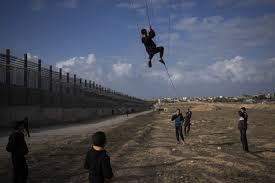
Context of the Cease-Fire Talks
In recent cease-fire negotiations between Israel and Gaza-based groups, one of the key issues has been Israel’s demand for control over two crucial corridors in the Gaza Strip. Understanding this demand requires a look at the historical, security, and strategic dimensions influencing both parties.
Table of Contents
Historical Background
The Gaza Strip and Blockades
The Gaza Strip, a densely populated area on the Mediterranean coast, has been a focal point of Israeli-Palestinian conflict for decades. Since the early 2000s, Israel has implemented a blockade on Gaza, citing security concerns related to Hamas, the governing authority in Gaza, and other militant groups. This blockade restricts the movement of goods and people, significantly impacting the daily lives of Gaza’s residents.
Previous Agreements
Historical agreements and cease-fires have often addressed the movement of goods and people in and out of Gaza. The 2012 and 2014 cease-fires, for instance, included provisions for humanitarian aid and limited access, but these were often temporary and subject to frequent violations and disagreements.
Security Concerns
Militancy and Smuggling
One of Israel’s primary security concerns is the potential for smuggling of weapons and other materials that could be used in attacks against Israeli targets. Control over the Gaza corridors would enable Israel to monitor and restrict the flow of goods, ensuring that materials capable of being used for military purposes are not entering Gaza. This measure is intended to mitigate the risk of renewed conflict and to provide a sense of security to Israeli citizens.
Cross-Border Attacks
The history of cross-border attacks from Gaza into Israel has been a significant factor in shaping Israeli security policies. By controlling key corridors, Israel aims to prevent the infiltration of militants and reduce the risk of rocket attacks and other forms of aggression. This control is seen as a necessary precaution to protect Israeli civilians and infrastructure.
Humanitarian Considerations
Access to Essential Supplies
While Israel’s demand for control over the Gaza corridors is primarily driven by security concerns, it also has implications for humanitarian conditions in Gaza. These corridors are crucial for the transportation of essential supplies such as food, medicine, and construction materials. Ensuring that these supplies can reach Gaza while still maintaining security is a delicate balance that needs to be addressed in the negotiations.
Potential Impact on Gaza’s Economy
Control over these corridors could also impact Gaza’s economy, which has already been heavily affected by the blockade. Restrictions on the flow of goods can stifle economic activity, leading to higher unemployment and further economic hardship. Negotiations need to consider how to manage the flow of goods in a way that meets both security needs and humanitarian requirements.
Strategic and Political Implications
Regional Relations
The issue of control over Gaza corridors also has broader regional implications. It affects Israel’s relations with neighboring countries and international stakeholders. Egypt, for instance, plays a role in the movement of goods and people between Gaza and the outside world. Israeli control over these corridors could affect its relationship with Egypt and other regional actors.
Diplomatic Leverage
By insisting on control over the corridors, Israel may be aiming to strengthen its negotiating position. This demand could be seen as a way to ensure that any agreement reached provides tangible security guarantees and addresses ongoing concerns about potential threats from Gaza.
Conclusion
Israel’s demand for control over two Gaza corridors in the cease-fire talks is rooted in a complex mix of security concerns, historical context, and strategic considerations. While aimed at preventing the smuggling of weapons and reducing the risk of attacks, this demand also has significant humanitarian and political implications. Balancing these factors is crucial in the ongoing negotiations to achieve a lasting and stable cease-fire agreement.







